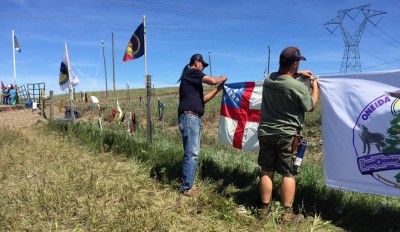From Facebook Episcopalians Stand with Standing Rock:
The following is a statement put forth by NDCIM, and endorsed unanimously by the Diocesan Council of The Episcopal Diocese of North Dakota.
1. The North Dakota Council of Indian Ministries (NDCIM) of the Episcopal Diocese of North Dakota stands in solidarity with the Standing Rock Sioux Tribe in their peaceful and prayerful efforts to halt the construction of the Dakota Access Pipe Line (DAPL) because of its degradation of sacred sites and possible catastrophic contamination of their drinking water and irrigation projects.
2. The NDCIM calls upon the U.S. Army Corps of Engineers to reverse its decision for construction of the DAPL, especially in light of the disregarded recommendations of three federal agencies (the Department of the Interior, the Environmental Protection Agency, and the Advisory Council on Historic Preservation) for further study and investigation of environmental impact. Furthermore, the rejection of the original plans for construction north of Bismarck due to potential dangers to their drinking water is an obvious example of environmental racism.
3. The NDCIM calls upon the appropriate governmental authorities to re-open State Highway 1806, not only is this closure an unnecessary inconvenience to Standing Rock residents, but it has effectively resulted in an economic sanction against the Standing Rock Nation.
4. There are Native American veterans and non-Native veterans alike that served in the Armed Forces historically and to the present day to protect the US and all citizens. Their valiant efforts should never be forgotten and based on that we support the efforts of government to government (sovereign tribal nations, states, and federal government) relations to resolve the DAPL crisis in a peaceful, expedient manner that is beneficial to all.
5. Given resolutions of recent General Conventions of The Episcopal Church (TEC), including but not limited to the Repudiation of the Doctrine of Discovery (2009-DO35), the expression of Solidarity with Indigenous People (2012-A131), the call to protect Indigenous Peoples’ Sacred Sites (2012-A132), and opposition to Environmental Racism (2000-D005), the NDCIM calls upon the Presiding Bishop and the Office of Government Relations of TEC to advocate for us.
6. The NDCIM requests the Diocesan Council to allocate 10% of the value of our Bakken royalties for 2016 for outreach efforts to the NO DAPL and Sacred Stone camps.
7. The NDCIM invites other Episcopalians and people of good will to join us in these efforts.
From the New York Times:
Horseback riders, their faces streaked in yellow and black paint, led the procession out of their tepee-dotted camp. Two hundred people followed, making their daily walk a mile up a rural highway to a patch of prairie grass and excavated dirt that has become a new kind of battlefield, between a pipeline and American Indians who say it will threaten water supplies and sacred lands.
The Texas-based company building the Dakota Access pipeline, Energy Transfer Partners, calls the project a major step toward the United States’ weaning itself off foreign oil. The company says the nearly 1,170-mile buried pipeline will infuse millions of dollars into local economies and is safer than trucks and train cars that can topple and spill and crash and burn.
But the people who stood at the gates of a construction site where crews had been building an access road toward the pipeline viewed the project as a wounding intrusion onto lands where generations of their ancestors hunted bison, gathered water and were born and buried, long before treaties and fences stamped a different order onto the Plains.
Amnesty International calls for protection for protesters
As thousands of Indigenous activists gather in 90-degree heat at the construction site of the Dakota Access Pipeline at the border of North and South Dakota, North Dakota state officials have shut down highways leading to the site and removed state-owned water tanks that have served as the main supply of drinking water for the encampment, citing public safety concerns.
Estimates of the number of people protesting the pipeline range from 2,000 to 4,000, and 29 people have been arrested over the past two weeks. Though there have been isolated reports of disorderly conduct, trespassing, and interference with observational aircraft, Governor Jack Dalrymple noted that the protests have been largely peaceful.
“Law enforcement has a duty to facilitate the rights to freedom of expression and assembly for those who wish to peacefully protest,” said Tarah Demant, senior director with Amnesty International USA. “International law allows the restriction of the right to freedom of peaceful assembly only if it is carried out for a legitimate aim, such as the protection of public safety. Any restrictions must be proportionate and necessary to meet that aim. Police should be able to maintain public order without repressing protesters’ freedom of expression.”
From the Standing Rock Sioux Tribal Chairman to North Dakota Governor:
Tribal leaders are committed to non-violence and peaceful prayer as the guiding principle of Cannon Ball River camps. We are doing everything in our power to promote that spirit. This is an opportunity to work together in a spirit of cooperation, and we should take advantage of that opportunity….
Everyone needs to keep in mind that our families are the ones most affected by the Governor’s decision to close parks, blockade roads, and use the language of confrontation rather than cooperation. We are just as conscious of the need for public safety as the Governor, but we do not feel the need to cancel our concerts, or close our parks. In fact, now more than ever, we want people to come to Standing Rock and visit. Just today, our Tribal Council voted unanimously that the roadblocks should be taken down. It is our mothers and fathers who are on the road this week as our children prepare for the opening of school. Our citizens rely on the roads to get from home to work. We are most harmed economically by shutting the last weeks of the tourist season.
Image: courtesy of the Rev. John Floberg

